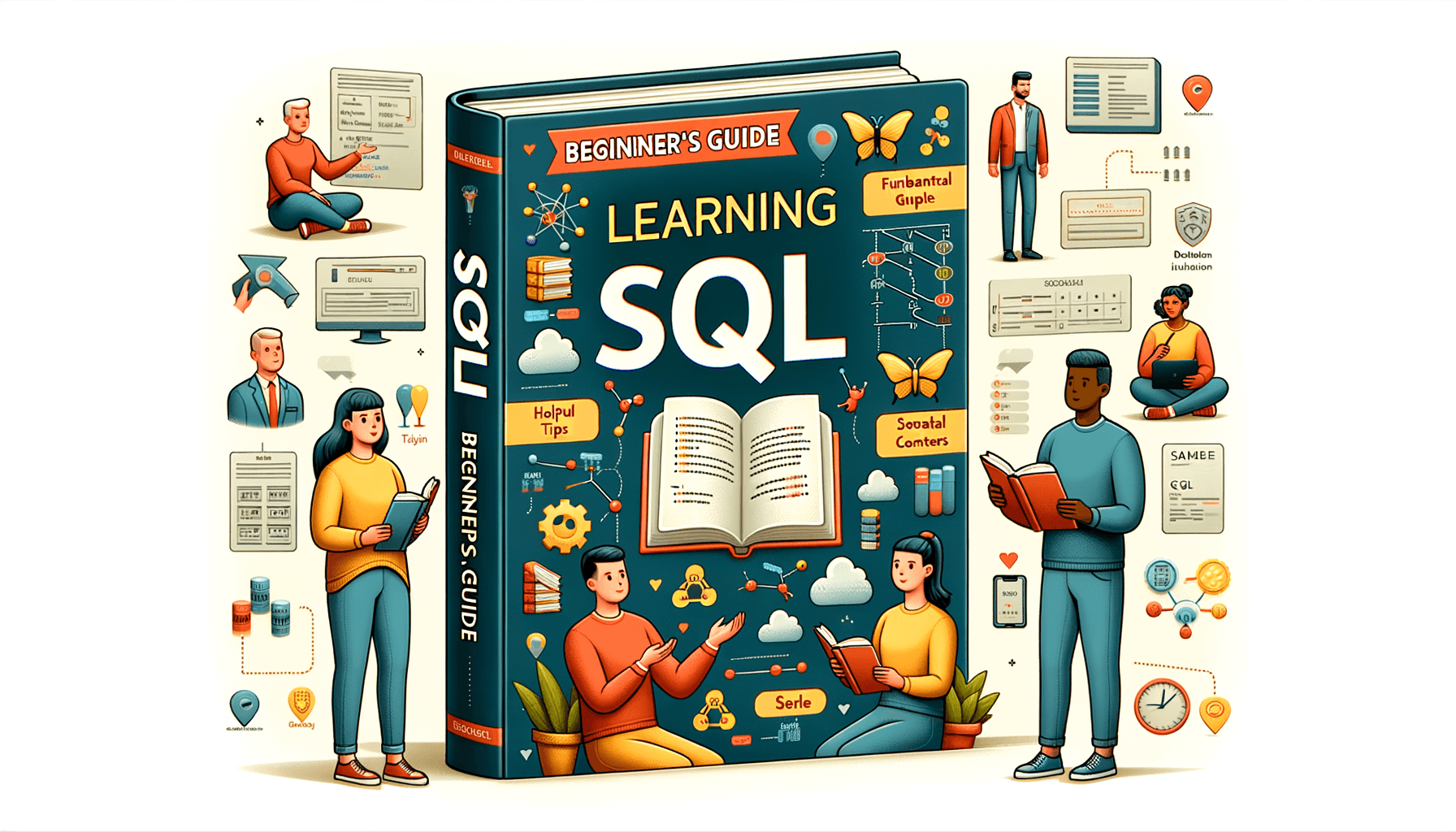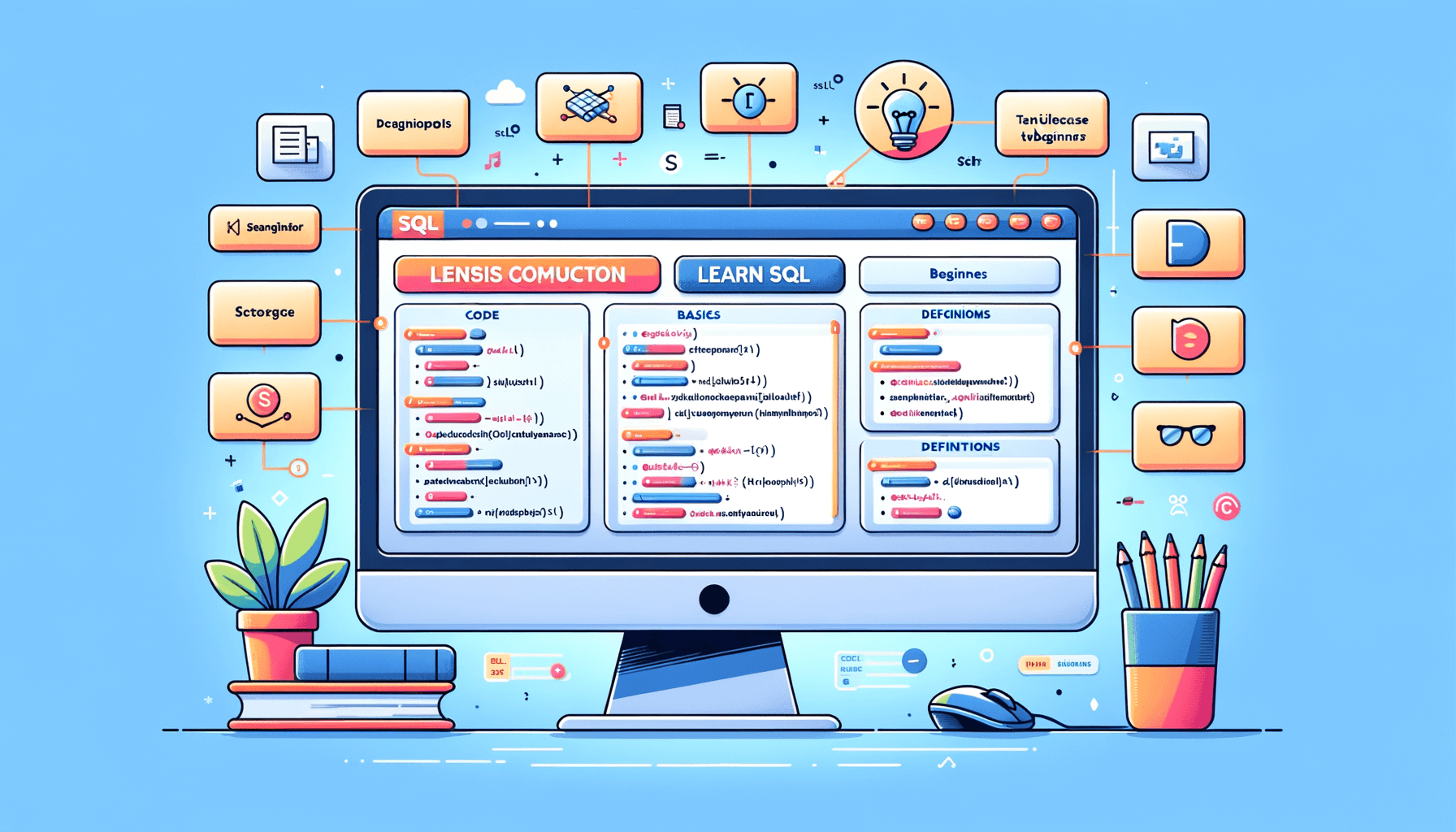A big variety of articles and resources

Master SQL with LearnSQL: The Ultimate Guide
 Sia Author and Instructor
Learn SQL
Sia Author and Instructor
Learn SQL
8 minute read
SQL Essentials for Beginners
Understanding Database Basics
Understanding the basics of databases is crucial for anyone looking to master SQL. Databases are the backbone of any data-driven application, and knowing how they operate is the first step in unlocking data science. This section will cover the fundamental concepts, including what databases are, how they store data, and the different types of databases available.
Exploring Different Database Types
There are various types of databases, each with its own set of features and use cases. From relational databases like MySQL and PostgreSQL to NoSQL databases like MongoDB, understanding these differences will help you choose the right course for your needs. This section will delve into the pros and cons of each type, helping you navigate resources effectively.
Table Structures and Relationships
Tables are the core components of any database. This section will teach you about table structures, how to define them, and how to establish relationships between tables. You'll learn about primary keys, foreign keys, and how to leverage free tools to build your learning path for data analysis skills.
Building a strong foundation in SQL is essential for any tech role. This knowledge will not only make you more versatile but also boost your confidence in handling real database tasks.
Advanced SQL Techniques
Mastering UNION and UNION ALL
In SQL, mastering UNION and UNION ALL is crucial for combining results from multiple queries. UNION removes duplicate records, while UNION ALL includes all records, even duplicates. This distinction is vital for accurate data analysis and reporting.
Using MIN and MAX Functions
The MIN and MAX functions are essential for finding the smallest and largest values in a dataset. These functions are particularly useful in aggregating data and generating summary reports. For example, you can quickly identify the highest and lowest sales figures in a given period.
Optimizing Query Performance
Optimizing query performance is a key skill for any SQL professional. Techniques such as indexing, query restructuring, and analyzing execution plans can significantly improve the efficiency of your database operations. This ensures that your applications run smoothly and can handle large volumes of data effectively.
Mastering SQL: advanced techniques for database management. Comprehensive guide covering advanced query techniques, joins, set operations, dynamic SQL, and stored procedures for efficient data analysis and optimization.
Effective Database Management
Database Schema Management
Managing a database schema involves organizing and structuring the database in a way that supports efficient data retrieval and storage. Essential SQL commands for system administrators play a crucial role in this process. Regular updates and optimizations ensure that the schema remains efficient and scalable.
Ensuring Data Integrity
Data integrity is vital for maintaining the accuracy and consistency of data within a database. Techniques such as constraints, triggers, and transactions are used to enforce data integrity rules. Engaging with communities for continuous learning and staying updated with trends can help database administrators keep up with best practices.
Handling Database Migrations
Database migrations involve transferring data from one database to another, which can be a complex process. Proper planning and execution are key to successful migrations. Learn through books, online courses, and tools to master this skill. Additionally, using version control systems can help manage changes and ensure a smooth transition.
Effective database management is not just about maintaining the current state but also about planning for future growth and changes. This proactive approach ensures that the database can handle increasing loads and evolving requirements.
SQL Joins Explained
INNER JOIN Techniques
Mastering INNER JOIN is crucial for combining rows from two or more tables based on a related column. This join type returns records that have matching values in both tables, making it essential for data analysis proficiency. Understanding INNER JOIN can significantly enhance your ability to manage and query relational databases effectively.
Left and Right Joins
Left and Right Joins are powerful tools for retrieving data from multiple tables. A Left Join returns all records from the left table and the matched records from the right table, while a Right Join does the opposite. These joins are particularly useful when you need to include all records from one table regardless of whether they have corresponding matches in another table.
Managing Complex Relationships
Handling complex relationships in databases often requires a deep understanding of various join types. By mastering SQL joins, you can efficiently manage and query complex datasets, ensuring data integrity and optimizing query performance. This skill is indispensable for anyone looking to accelerate their journey from novice data analyst to SQL expert.
Mastering SQL joins is a fundamental step in becoming proficient in database management and data analysis.
Challenge-Based Learning
Real-World Problem Solving
Engage in advanced exercises and quizzes that prepare you for high-stakes database management scenarios. You'll gain practical learning experience by solving real-world problems, which is essential for mastering SQL quickly.
Interactive Quizzes and Exercises
Our platform offers a variety of interactive quizzes and exercises designed to reinforce your understanding of SQL concepts. These activities are crucial for building confidence and proficiency in SQL.
AI Assistance for Learning
With the help of AI assistance, you can receive personalized support and feedback as you work through complex SQL challenges. This feature ensures that you can learn SQL fast and easy, even without prior coding experience.
Bold: Engage in advanced exercises and quizzes that prepare you for high-stakes database management scenarios.
Italics: These activities are crucial for building confidence and proficiency in SQL.
Leadership in Database Projects
Leading Database Teams
Effective leadership in database projects requires a blend of technical expertise and interpersonal skills. Leading a team of database professionals involves not only understanding the intricacies of database management but also fostering a collaborative environment. Key responsibilities include setting clear goals, providing regular feedback, and ensuring that each team member has the resources they need to succeed.
Project Management Skills
Project management is crucial for the successful execution of database projects. This involves planning, executing, and closing projects while managing the constraints of scope, time, and cost. Utilizing project management tools and methodologies, such as Agile or Waterfall, can help in organizing tasks and tracking progress. A well-structured project plan ensures that all team members are aligned and that the project stays on track.
Implementing Best Practices
Adopting industry best practices is essential for maintaining high standards in database management. This includes regular database backups, performance tuning, and security measures. Implementing these practices not only ensures the smooth operation of the database but also prepares the team to handle any unexpected challenges. Mastering SQL with structured learning paths and online resources can significantly enhance your ability to implement these best practices.
Effective leadership in database projects is not just about managing tasks but also about inspiring and guiding your team to achieve their best.
Scalability and Integration
Efficient database integrations are crucial for seamless data flow between systems. Mastering SQL techniques can significantly enhance your ability to handle complex integrations, ensuring data accuracy and integrity.
Handling large datasets requires a deep understanding of SQL optimization techniques. By focusing on performance tuning, you can manage and query extensive data efficiently, which is essential for integrating SQL and data science.
Optimizing for scalability involves designing databases that can grow with your data needs. This includes implementing best practices for indexing, partitioning, and query optimization to maintain performance as data volume increases.
Scalability is not just about handling more data; it's about maintaining performance and reliability as your system grows. Ensuring data accuracy and integrity is paramount in this process.
Scalability and integration are crucial for any growing business. Our courses are designed to help you master these essential skills, ensuring your systems can handle increased demand and seamlessly integrate with other technologies. Ready to take your skills to the next level? Visit our website and explore our comprehensive course catalogue today!
Conclusion
Mastering SQL is a critical skill for anyone involved in data management, and LearnSQL offers the ultimate guide to achieving this expertise. Through a combination of expert-led courses, hands-on projects, and personalized support, LearnSQL ensures that you not only understand SQL concepts but also know how to apply them in real-world scenarios. Whether you're a beginner or an experienced professional, the comprehensive curriculum and practical exercises will equip you with the knowledge and confidence needed to excel in any data-driven role. Join LearnSQL today and take the first step towards becoming a SQL master.
Frequently Asked Questions
What is the duration of the LearnSQL course?
The course includes 6 videos and has a total duration of 6 hours.
Who is the instructor for this course?
The course is instructed by Eric Vanier, a SQL and Database Performance Specialist with over 25 years of experience.
What kind of support is available during the course?
The course offers AI assistance to support your learning journey.
Are there any practical exercises included?
Yes, the course includes 15 exercises that mimic real-world database management challenges.
Is there a free introductory lesson available?
Yes, you can access free introductory lessons to master the basics of SQL without any credit card requirement.
What topics are covered in the advanced SQL techniques section?
The advanced SQL techniques section covers mastering UNION and UNION ALL, using MIN and MAX functions, and optimizing query performance.
Related Articles

Is It Easy to Learn SQL? A Beginner's Guide to Mastering SQL
10 minute read

Learn SQL Free Online: Your Path to Data Mastery
9 minute read

Learn SQL Language Free: A Comprehensive Tutorial
8 minute read


